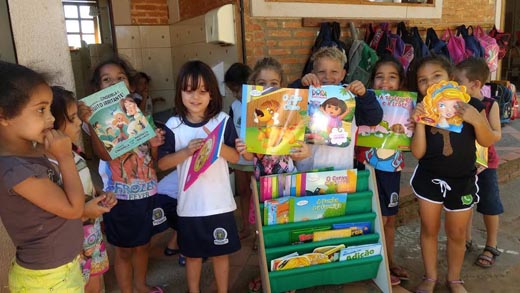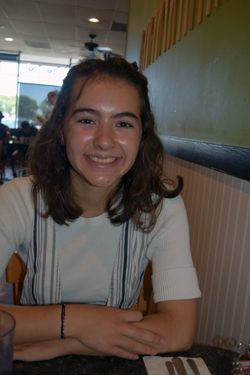
By Donald H. Harrison


SAN DIEGO – Beatriz de Oliveira, 17, a senior at Torrey Pines High School, absorbed an important lesson every day from her mother, Dr. Daniela Carvalho, an otolaryngologist at Rady’s Children’s Hospital: “Do a mitzvah every day,” her mother has insisted both to her and Beatriz’s younger brother, Victor, 13.
As a result, the teens grew up finding ways to do good deeds for other people. Beatriz, a native Brazilian who goes by the nickname of Bea (as in “Be A Mensch”), volunteers to drive members of the family here and there, and the two siblings wash dishes, do household chores, and help neighbors take care of their lawns. On one occasion when Dr. Carvalho and Victor were running together, they came across a homeless woman who was hungry. They ran two miles back to their home in the Carmel Valley area to fetch some food, and then returned with it on the double so that the woman could have something to eat.
When Beatriz works behind the counter at Gelateria Frizzante in La Jolla, she saves from her tips money that she can give to homeless persons who request help. “You never know what can make an impact,” she says.
Recently, Beatriz was honored with a $36,000 Diller Teen Tikkun Olam Award funded by the Helen Diller Family Foundation in recognition of the work she has been doing in Brazil to promote literacy and to better the lives of pre-schoolers.
Beatriz visits her grandmother’s home in Campinas, Brazil, at least once a year, and many times twice a year. On one occasion, she accompanied her grandmother, Gabriela Stangehaus, bringing toys to a creche (day care center) in a favela (slum) where, to her dismay, she noted that there was not a single book for the 200 children there, ages 0-5, to either read or to have read to them.
She noted in an interview that education was always stressed by her mother, who is an ear-nose-and throat surgeon, and her father, Mauricio de Oliveira, a PhD in aerospace engineering who teaches at the UC San Diego. Beatriz said she learned to read early as a child, loving such books as Beauty and the Beast and other children’s classics.
After returning to San Diego from that eye-opening trip to Campinas, Beatriz did some research, learning that 70 percent of Brazilian elementary school pupils currently are reading below their grade levels. “A lot of this comes from their not being able to obtain books or literacy before they go to school,” Beatriz said.
So, at age 13, she started collecting money from relatives, friends, and neighbors to purchase books and book shelves for the Campinas creche.
The next time she visited her grandmother, she showed the bookcase to a local carpenter, and asked if he could make more just like that. The carpenter was happy to do so – at a price considerably less expensive than Beatriz had paid in San Diego.
She also went to the owners of a book store in Campinas and explained her project to them, persuading them that it would be beneficial for all concerned if they sold to her the books at a discount.
There was considerable excitement about reading at that one Campinas day care center, but Beatriz said she understood that the need was so much greater. “There are thousands of creches in Brazil,” she said. “I thought, ‘There are so many more kids who are not getting access to literature. Why don’t I make this something bigger and change more lives?'”
Too young to form a non-profit organization on her own, she enlisted the help of the Social Good Fund to sponsor “Books For A Change,” which now tells its story and is eligible to receive tax-deductible donations on-line.
In the last four years, she said proudly, her organization has served “more than 10,500 children” in Brazil, and has prompted four affiliated clubs to be started at Del Norte, Mt. Carmel, Poway, and Rancho Bernardo High Schools.
The scope of the Books For A Change continues to grow incrementally, Beatriz said. Many of the day care volunteers are not well versed in reading aloud, much less in techniques for reading to children, so the organization is in the process of making a video to demonstrate ways not only of reading but to get the children involved in the stories.
Additionally, it is continually expanding the number of cities and towns to which it is delivering shelves of children’s books.
At one creche in the Sao Paulo area, she told me, volunteers barely had put up a book shelf, when “this little boy comes tearing towards the shelf. He couldn’t have been more than 3 or 4 years old, and he didn’t know how to read, but he runs out with a book. Where did he go? He was found a few minutes later sitting under a tree, flipping through the pages of this book. It was a beautiful moment. His eyes were just lit up by this book.”
Beatriz added, “It is really incredible the effect a single book can have on a kid – even though he couldn’t read the words, he was engrossed in it. It was truly a heartwarming moment.”
The project, which started with a single bookshelf filled with books, “has changed my perspective on what healing the world (tikkun olam) really means,” Beatriz commented.
“A lot of people, when they think of change, or of making the world a better place, think of ‘huge actions,’ like you have to donate millions of dollars or start your own charity. I think just from seeing the impact that something as small as a book can have, you learn that the smallest things can make a difference – one 10-page book can change the life of a child.”
The $36,000 awarded by the Helen Diller Family Foundation may be used to continue the recipient’s education, to further the awardee’s cause, or be donated to a favorite charity, Beatriz told me.
She said she plans to use $30,000 to help her family finance her college education. Currently carrying a weighted 4.8 grade point average, she is in the process of applying to universities on both coasts of the United States, as well as in Chicago, and in England.
Another $5,500 she will earmark for the Books For Change project, she said. With the U.S. dollar worth four Brazilian reals, and with the cost of goods very less expensive in Brazil, “a little money goes a long way there,” Beatriz said.
She said the other $500 will be donated to Planned Parenthood, an organization she became familiarized with while working as a student intern in the district office of State Senate President pro tempore Toni Atkins, D-San Diego.
This coming semester, she said, she will serve as an intern in the district office of U.S. Rep. Susan Davis, D-San Diego.
With an abiding interest in politics, Beatriz says she may major in college in political science, international relations, or economics, or perhaps some combination of the three.
Every year there are 15 Jewish students across the country who are awarded $36,000 each by the Helen Diller Family Foundation. This year, three of those students came from San Diego County, with the others being Ethan Hirschberg of Carlsbad, who sensitizes audiences to the challenges of autism, and John Finkelman of San Diego, who works with refugees coming to the United States.
Besides the cash award, says Beatriz, one of the greatest benefits of winning a Diller Teen Tikkun Olam Award is to be able to meet fellow teens “who are willing to do good in the world and who have done incredible things.”
*
Harrison is editor of San Diego Jewish World. He may be contacted via donald.harrison@sdjewishworld.com
Nice story.